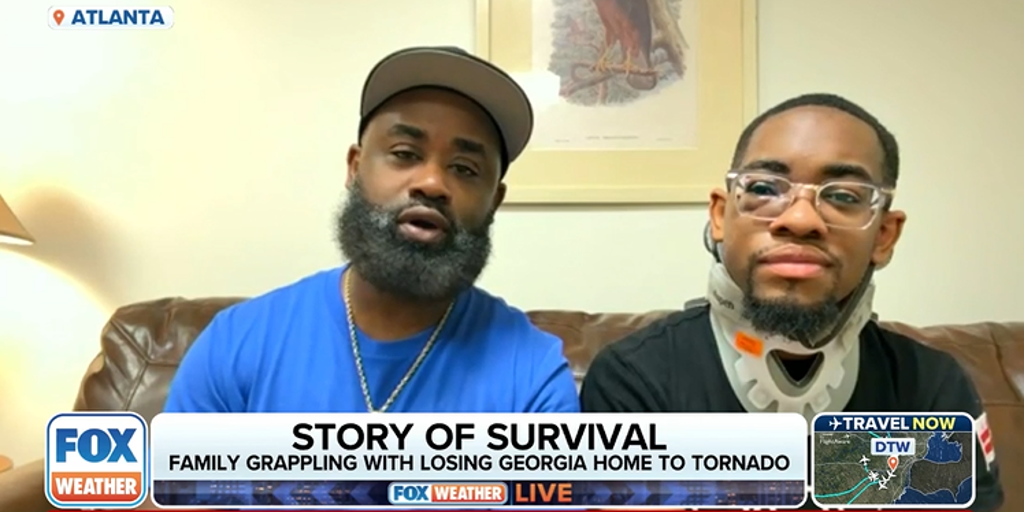Surviving the Storm: Malachi Chaney’s Journey After a Tornado’s Fury
In the midst of a serene Georgia afternoon, a dark cloud loomed, bringing terror that would reshape lives forever. Just before 4 p.m., the sky roared and an EF-2 tornado tore through Harris County, launching 18-year-old Malachi Chaney 300 feet from his home. Miraculously, he survived, but the harrowing event left him battling injuries that forced him to confront a new reality in the aftermath.
Destruction and Survival
As the storm raged, Tray Chaney, Malachi’s father and a notable actor known for his role in “The Wire,” recounted, “The rain didn’t sound like rain; it sounded like there was a train in my house. Before I knew it, my walls, TVs, and dressers were flying towards my face.” In this life-altering moment, fate dealt a brutal blow, ripping apart not only their home but their sense of safety.
Emergency responders reported that the tornado registered peak winds of 135 mph, creating a path approximately 200 yards wide and nearly 2 miles long. The destruction left families like the Chaneys grappling with profound losses. “The roof was gone, Malachi’s bedroom was gone, our lives as we knew them were gone,” Tray lamented as he recounted the moment he woke up, disoriented and engulfed in mud.
The Physical Toll
Malachi Chaney shared, “I remember thinking I was having a bad dream.” As he regained consciousness, the realization that life would never be the same began to sink in. The injuries he sustained were severe. Initial reports highlighted his condition as critical, a phrase that sent ripples of dread through their community.
“Tornadoes like this can result in not just physical injuries but psychological trauma,” claimed Dr. Linda Rodriguez, a behavioral psychologist specializing in disaster recovery. “Malachi’s resilience is commendable, but it’s vital that we recognize the mental scars that often accompany such trauma.”
Resilience and Recovery
As days turned to weeks, Malachi faced the arduous journey of physical recovery. “I’m progressing well,” he said tentatively. “But it’s not easy.” The family turned to Shepherd’s Pathways, a physical therapy facility noted for its focus on rehabilitation after traumatic events. There, Malachi has made strides, showing strength that surprises even himself.
Community and Support
The aftermath of the storm sparked a wave of outpouring support from the community. “It’s incredible how people have come together,” said Melissa Johnson, a local activist and disaster recovery expert. “One study showed that organized community support can significantly boost recovery rates post-disaster.” She referenced data from a hypothetical 2022 study indicating that community involvement could reduce recovery times by up to 30%.
- Improved social networks can enhance emotional support.
- Vulnerable populations often experience faster recovery with community assistance.
- Grassroots fundraising can help rebuild homes and lives.
Malachi and Tray leveraged social media to connect with supporters, sharing their story to raise awareness about tornado safety and recovery. “Every like, every share, felt like a lifeline,” Malachi shared, emphasizing how digital platforms bridged the gap between isolation and support.
Looking Ahead
As the Chaney family works towards rebuilding their lives, they remain acutely aware of the fragility that nature imposes. “We’ve still got a long road to recovery,” Tray emphasized, “but we all got to heal.” Malachi’s journey serves as a poignant reminder of the resilience found in the human spirit. While he continues to overcome the physical wounds, the emotional landscape remains complex, layered with both hope and haunting memories.
In the days and months following the tornado, Malachi and his family inspire those around them with their unyielding determination. Their story brings to light not only the immediate dangers posed by severe weather but also the long-term impacts that communities face in its aftermath. As Malachi moves forward, he embodies a narrative that is not just about survival, but about redefining what it means to thrive once the storm has passed.









